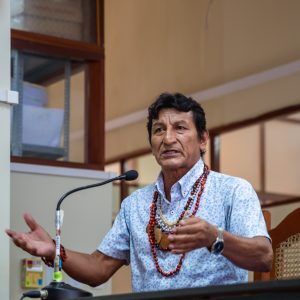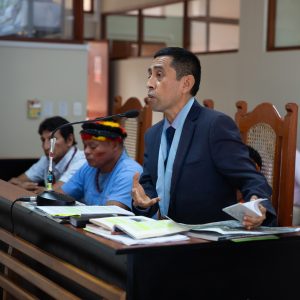On March 21, 2023 the three Apus of Loreto’s Indigenous communities stood before the Superior Court of Loreto, Peru. One by one, each spoke on behalf of their communities. They called attention to the human rights and environmental abuses perpetrated by Plus Petrol and the Peruvian State on their ancestral lands. At the end, Apu Alfonso Diaz named their demand in simple, yet powerful terms.

“Magistrates, we ask only one thing of you: to enforce the right we have to our own territory, our world, this knowledge we have inherited from our ancestors.”
Civil society organizations Oxfam, Puidamudt and Peru Equidad also attended the trial to support the Indigenous communities of Loreto. Representatives for PlusPetrol joined the audience via video, while the Peruvian Ministry of Energy and Mines declined an invitation to appear in court.
In the days after the trial, Land Rights Now spoke with Dr. Henry Carhuatocto, the lawyer of the Apus and president of the Institute for the Legal Defense of the Environment and Sustainable Development (IDLAS). Dr. Carhuatocto, who worked closely with the communities of Loreto throughout the appeal process, explained the implications of a win in court.

What would a win in court mean for the Indigenous communities of Loreto?
“The ruling would create a precedent for Peru. At the national level, such a precedent would allow us to consider natural resources as part of the property title of an Indigenous community. Through those property rights, they are entitled to benefit sharing with extractive companies operating in their territory. This right is defined in ILO Framework Convention 169. . . To put it another way, titling would expand their rights, including the right to shared economic benefits.
There is also a good chance we will win reparations for easements due to the absence of the Ministry of Energy and Mines from the March 21st court hearing. Only PlusPetrol’s lawyer and the Public Prosecuter showed up. If we win, reparations will be paid by either the company or the State.”
What would a win in court mean for future land rights cases brought by Indigenous communities?
There is currently no similar judgment in other countries in the region, including Colombia, Ecuador, and Bolivia. There are rulings on the river as the subject of rights, and precedents in the inter-American Court of Human Rights on prior consultation. However, this ruling is unique and opens up avenues for pursuing rights in other countries as well. For this to happen, we would need approval by the Peruvian Supreme Court; an additional process that can take some time. If successful, this case could set a precedent at both the regional and national level.
What comes next?
We will know the outcome of the appeal within three months. Until then, Land Rights Now will be working closely with the Indigenous communities from Loreto, Oxfam, and Puidamudt.
In the meantime, you can watch our campaign video on Youtube! https://www.youtube.com/watch?v=2Gd3NDgBqvc



